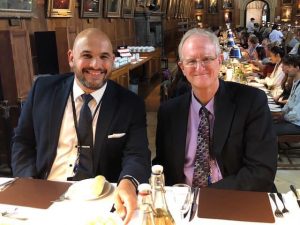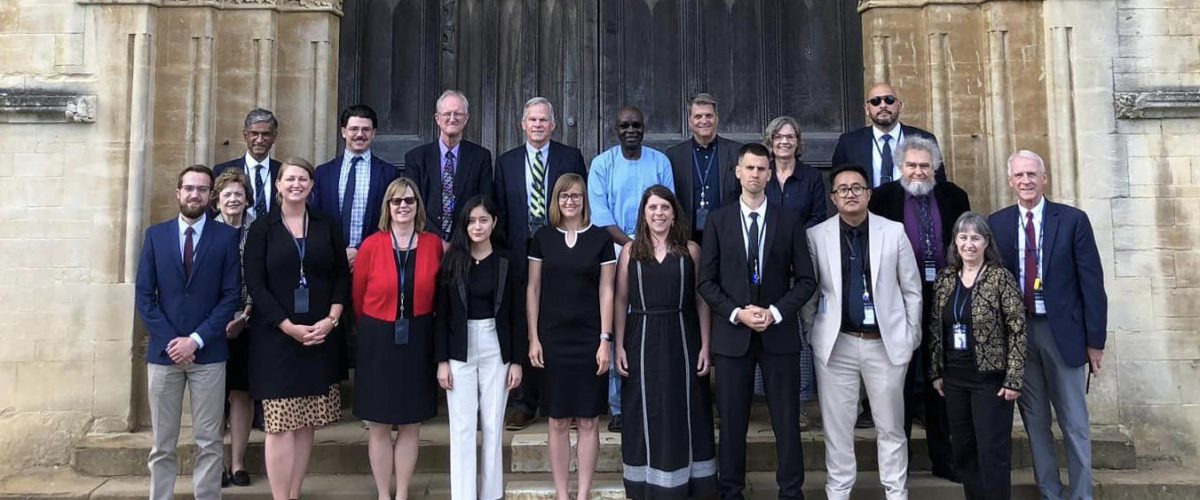You might imagine Oxford, England, to be a wizened, ostentatious sprawl of academic architecture and higher learning. To be a place where people can retreat from the urgent demands of now and lose themselves in books and the rural countryside.
While Oxford does offer retreat and idyllic scenery, it also attracts the whole world to its academic doors. It proved to be a perfect place to discuss global missions at this year’s Baptist Scholars International Roundtable.

Laura Levens
As I stepped off the bus near the front gate of Christ Church, I noticed the global reach of Oxford immediately. People from China, America, the Middle East and Africa all had come to visit Oxford. The global draw of people invested in scholarship also was apparent in the BSIR group as well. We had participants from Brazil, Mexico and Italy. We were from the Nagaland territory of India and from Nigeria. We were from South Africa, England, Canada and the United States.
Our research likewise covered the globe, both in our historical and geographical reach.
Husezo Rhakho and Senchumbeni Kikon both presented on Baptist missions to Nagaland in the late 1800s. Two important social elements Northern Baptists cared about at the time, namely teetotalism against alcohol and hymnody in worship, have continued effects upon the church and social life in Nagaland, where Baptists comprise the vast majority of the population.
Rhakho and Kikon highlighted how Baptist mission had connected to the Nagas through singing or provided means of opposition to external control via imported liquors as the Christian faith took root among the tribes in Naga. However, they also had critiques for how missionaries and their use of temperance and hymnody had separated Naga Christians from their ethnic social groups and elevated Western styles of music as the dominant form of worship singing.
For Rhakho and Kikon, their research is critically necessary to ongoing efforts to understand and support the Naga church today. Researching the past to provide essential understanding and support, the church of today was a recurring theme across many of the presentations. Although we came from a variety of places, we shared an energy for combing history in order to better understand the present moment and provide wisdom for tomorrow.

Oxford University
This energy to comb the past included a willingness to address difficult issues, especially that of Baptist missions and colonialism. I found it remarkable that so many of our presentations covered political wars and confrontations across empires that were barely even mentioned in my American historical education.
For example, Ángel Gallardo told the history of 30 years of rebellion in Texas, from the Texas insurrection against Mexico (1835-1837) to the North American invasion of Mexico (1845-1847) to the U. S. Civil War (1865-1867). Within this story, Gallardo traced Baptist evangelists and colporteurs who followed after the armies, at one point even aligning with the U.S. Army to have the soldiers distribute tracts. Gallardo noted the Baptists and Bible Society workers had no qualms about combining their missionary practice with the state’s acquisition of new territory under Manifest Destiny, nor did they hesitate to align with pro-slavery Texans.
“Christian mission does not happen in isolation from the political and social realities that people live in.”
Although this historical content can be hard for supporters of global missions in the United States to digest, it is important to realize that Christian mission does not happen in isolation from the political and social realities in which people live.
In academic speak, mission always happens in context. In sharing our research, we confirmed that plans can be made by foreign mission boards and theology of mission can be composed and preached, but what political and church powers are doing at the time directly affects how mission is practiced.
We talked about mission as resistance to empire, mission in the pocket of empire and, above all, what happens when the means or actions of mission are confused with the ultimate goal of mission.
Gerald Pillay, an ecclesiastical historian and theologian, contributed an important global theological outlook. A native of the Natal region of South Africa and citizen of New Zealand, Professor Pillay encouraged us to remember that above all, mission is God’s work of reconciliation, wherein God in Christ is reconciling the world to Godself. When Christians try to control or reduce the parameters of mission to anything smaller, such as promoting conversion or concentrating church power, then Christians are prone to “the terrible excesses that we do in our piety” as exhibited in our research.
To live in mission by following Christ, Pillay says, requires Baptists to “become a living letter, temple of our bodies, God dwelling in us and living the testimony.”
Even so, humanity as we experience it continues to be full of shadow and light. Or, as missiologist David Bosch once put it, the church is “an inseparable union of the divine and dusty.”

Baylor University professors Joao Chaves and Doug Weaver
I felt both contented and challenged as I returned home from Oxford and BSIR. I am contented by this circle of scholars, who are now my colleagues and friends. I also am challenged to continue the work of researching and teaching on Baptist global missions. We are doing vibrant work that will provide living sustenance to the church and academia for years to come.
On Oct. 1, Baptist Scholars International Roundtable will begin accepting a new round of proposals for its 2024 meeting on the topic of “Baptists and Global Mission.” Scholars do not have to be Baptist to submit a proposal, but the scholarship must study Baptists or engage Baptist thought in some way. If you have questions, contact BSIR Co-Director João Chaves.
Laura Levens serves as assistant professor of Christian mission at Baptist Seminary of Kentucky. She is a graduate of Baylor University and earned a doctor of theology degree from Duke University Divinity School. She is ordained within the Cooperative Baptist Fellowship and lives in Lexington, Ky., with her husband and two children.
Related articles:
Baptist Scholars Roundtable considers the future of training church leaders
Baptist Scholars International Roundtable finds serendipity in participants’ experiences


